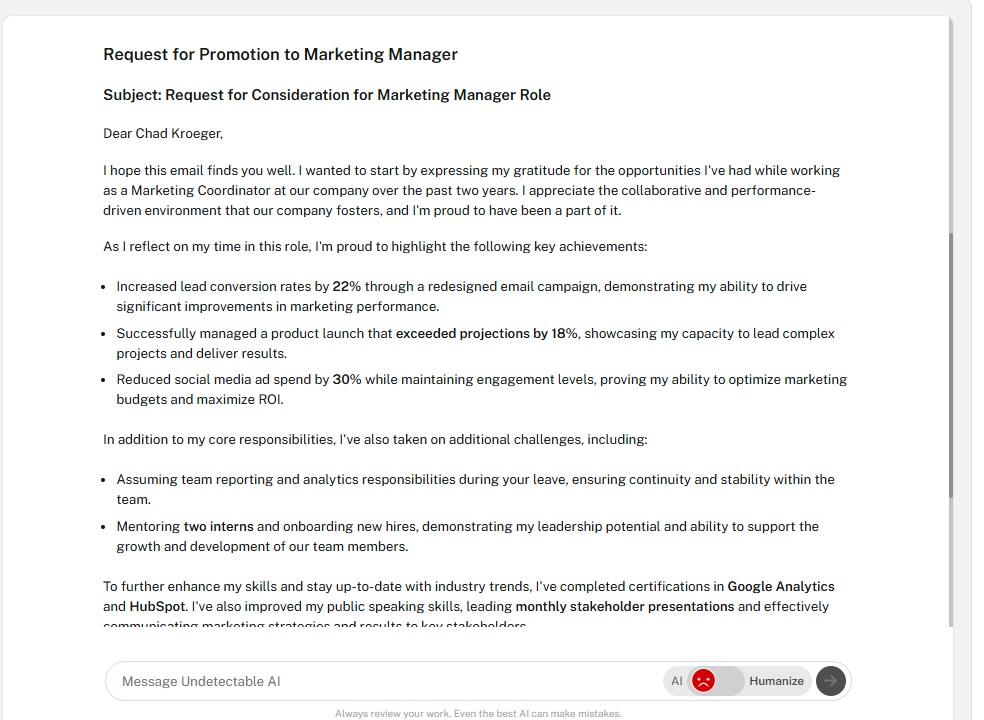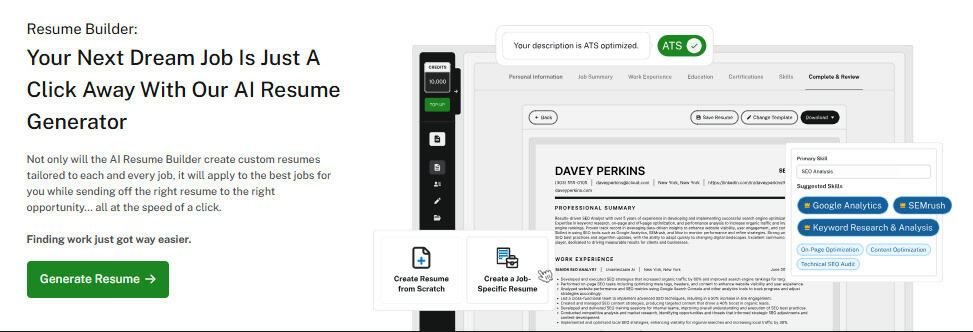Working in the corporate world is not for the faint-hearted, with so many battles to win and ladders to climb.
As your career progresses, your goal is not to be stuck in the same position for years. You’ll want to learn new skills, develop your knowledge, and get a promotion.
But contrary to what others believe, promotion isn’t always earned. You can also ask for one.
Office scenarios like these don’t just happen in the movies.
You know the scene where a mailroom guy walks into his boss’ office, delivers a ridiculous speech on why he deserves it, and walks away with a new title?
You can pull off something similar, but with less drama.
Yet we understand the anxiety surrounding this topic, and that’s why this guide was written to prepare you and make you feel like “it’s time.”
Asking for a promotion is half skill, half strategy. Here’s how to get it right.
Know When It’s the Right Time
Timing isn’t everything, but it’s pretty close.
Ask too early, and you look entitled. Ask too late, and someone else might snag the opportunity you’ve been eyeing.
So, when is the right time to ask for a promotion?


Never Worry About AI Detecting Your Texts Again. Undetectable AI Can Help You:
- Make your AI assisted writing appear human-like.
- Bypass all major AI detection tools with just one click.
- Use AI safely and confidently in school and work.
- You’ve been in your current role for at least six months: Any less and you haven’t had enough time to prove your value. Most companies expect you to master your current responsibilities before taking on new ones.
- Your performance reviews have been consistently positive: If your last review mentioned areas for improvement, work on those first. You want your track record to speak for itself. It can also help to see how managers structure these evaluations – PeopleHR has a solid breakdown that shows what they’re actually assessing, so you can frame your wins accordingly.
- You’re already doing work above your pay grade: This is huge. If you’ve been taking on additional responsibilities, managing projects, or mentoring junior team members, you’re already operating at the next level.
- The company is doing well financially: It’s tough to get promoted during layoffs or budget freezes. Pay attention to company earnings, new hires, and overall business health.
- Your manager isn’t overwhelmed with other priorities: Don’t ask for a promotion the day before a major deadline or during the company’s busiest season. Pick a time when your boss can actually focus on the conversation.
- You’ve achieved specific, measurable results: Vague statements like “I work really hard” won’t cut it. You need concrete examples of how you’ve contributed to the company’s success.
- There’s an actual opportunity available. This could be an open position or a newly created role. It’s harder to get promoted into thin air, especially when you’re eyeing your first promotion.
Want to test your timing? Use Undetectable AI’s AI Chat to simulate a conversation with your manager. Practice explaining why now is the right time for your promotion.
The AI can help you assess whether your reasoning sounds strategic and reasonable, not desperate or presumptuous.
Prepare a Strong Case for Your Promotion

Walking into a promotion conversation empty-handed is like showing up to a courtroom without evidence.
If you want your ask to be taken seriously, treat it like what it is: a business proposal.
Start by laying out your impact. Not just what your job is, but what you’ve done with it. Say you’re a project coordinator. It’s one thing to say you “manage timelines.”
It’s another way to show you cut delivery delays by 15% over the last two quarters.
That’s the kind of data that gets attention. Numbers make your argument concrete.
So if you’ve increased revenue, streamlined a clunky workflow, or onboarded ten new hires in record time, put that in writing.
Better yet, attach dollar signs or percentages wherever you can.
Professional growth matters too.
Whether you picked up a new certification, finally mastered that analytics platform, or turned your stage fright into confident client presentations, these shifts matter.
They signal momentum.
Next is understanding the role you want. Know the responsibilities, required skills, and salary range. Don’t avoid it, get ahead of it.
Explain how you’re working to close that distance, maybe through mentorship, training, or shadowing someone already in that role.
And don’t be afraid to bring in some backup.
A quick Slack message from a colleague praising your project management, or a thank-you email from a client, can give your case more weight.
Finally, prepare for different responses. Be ready if your manager says yes, needs time, or offers something else entirely.
Practice What You’ll Say (and How You’ll Say It)
You wouldn’t give a presentation without rehearsing. The same logic applies to asking for a promotion.
Practice makes the difference between a confident, compelling request and an awkward, rambling conversation.
- Start with your opening statement: You need a clear, direct way to begin the conversation. Something like:
“I’d like to discuss my career growth and the possibility of a promotion. I believe I’m ready to take on more responsibility and contribute at a higher level.”
- Craft your elevator pitch: In two to three minutes, you should be able to summarize your key achievements, the value you bring, and why you deserve a promotion. Practice until it feels natural.
- Prepare specific examples: For each major accomplishment, have a brief story that illustrates your impact. Use the STAR method: Situation, Task, Action, Result. This structure keeps your examples focused and compelling.
- Anticipate questions and objections: Your manager might ask about your long-term goals, how you’d handle increased responsibility, or why you think you’re ready now. Practice your responses until they sound conversational, not rehearsed.
- Work on your delivery: Record yourself or practice with a trusted friend. Pay attention to your tone, pace, and body language. You want to sound confident but not arrogant, enthusiastic but not desperate.
- Plan your ask: Be specific about what you want.
Instead of “I’d like a promotion”
Say, “I’m interested in moving into the Senior Marketing Specialist role that opens up next quarter.”
Specific requests are easier to evaluate and approve.
- Practice active listening: This conversation isn’t just about you talking. Your manager will likely have questions, concerns, or feedback. Practice staying engaged and responding thoughtfully rather than just waiting for your turn to speak again.
- Prepare for silence: After you make your request, your manager might need time to think. Don’t fill comfortable silences with nervous chatter. Let them process what you’ve said.
Write a Compelling Email or Letter
Sometimes you need to make your case in writing first. Maybe your manager prefers email communication. Maybe you want to document your request.
Or maybe you’re more comfortable organizing your thoughts on paper before having the conversation. Unlike cover letters and resumes, this isn’t about selling yourself to strangers.
A well-written promotion request email serves multiple purposes.
It shows professionalism, gives your manager something to reference when discussing your request with higher-ups, and demonstrates your communication skills.
Here’s how to structure your email:
- Subject line: Keep it clear and professional. “Request for Meeting to Discuss Career Advancement” or “Promotion Consideration Request” works well.
- Opening: Start with appreciation. Thank your manager for their leadership and support. Then state your purpose clearly.
- Body: This is where you make your case. Include your key achievements, additional responsibilities you’ve taken on, and specific ways you’ve contributed to team or company success. Use bullet points to make it scannable.
- The ask: Be direct about what you want. Specify the role, title, or level you’re targeting.
- Next steps: Suggest a meeting to discuss your request in detail. Offer a few specific times that work for your schedule.
- Closing: End professionally with appreciation for their consideration.

Want to craft the perfect promotion request email?
Here’s a detailed prompt you can use with Undetectable AI Chat to generate a professional, personalized email:
“I need help writing a professional email to request a promotion. Here are my details:
- Current role: [Your current job title]
- Target role: [The position you want]
- Time in current role: [How long you’ve been in your position]
- Key achievements: [List 3-4 specific accomplishments with metrics if possible]
- Additional responsibilities: [Tasks you’ve taken on beyond your job description]
- Skills developed: [New competencies you’ve gained]
- Manager’s name: [Your boss’s name]
- Company culture: [Formal/casual, collaborative/hierarchical, etc.]
Please write a compelling promotion request email that includes:
- A professional subject line
- An appreciative opening
- A clear presentation of my qualifications and achievements
- A specific request for the target role
- A request for a meeting to discuss further
- A professional closing
Keep the tone confident but respectful, and make sure it sounds authentic to my situation.”
After generating the email with AI Chat, use Undetectable AI’s AI Humanizer to ensure it sounds natural and personal rather than robotic or templated.
Together, these tools give you a professional starting point that you can customize to match your voice and specific situation.
Schedule the Meeting with Your Manager

The actual promotion conversation needs to happen face-to-face (or video-to-video if you’re remote).
Email is great for initial requests or documentation, but important career discussions require real-time interaction.
Start by requesting a dedicated time slot, rather than bringing it up casually at the end of another meeting. Group scheduler tools like WhenAvailable or other When2meet alternatives can help you find time slots that work for everyone.
A simple message like “Can we schedule 20 minutes to talk about my role and future growth here?” sets the tone without sounding too heavy. This also gives your manager time to prepare and avoids catching them off guard.
Be mindful of timing. Don’t request a promotion discussion during peak deadlines, budget season, or when your manager is visibly overwhelmed.
Look for a window when they can actually listen and engage.
If you’re remote, make sure your setup is distraction-free and your camera is on.
Body language and tone go a long way in these conversations. You want to come across as confident, thoughtful, and focused, not rushed or uncertain, and most importantly, ready to be a leader.
Show that you’re serious by being prepared, composed, and clear about what you’re asking for.
What To Do if You Don’t Get the Promotion
Rejection stings. There’s no question about it.
You made your case and got a “no” or “not yet.” The urge to feel frustrated or jump to job boards is normal, but pause first.
Not getting promoted doesn’t mean you won’t ever be.
There may be budget issues, company timing, or gaps you still need to close. Focus on what’s within your sphere of control and ask for specific feedback.
Vague answers like “more experience” aren’t helpful. Push (professionally) for clear, actionable input.
Use that feedback to build a development plan with your manager. Set measurable goals and timelines, and document everything along the way.
This will show initiative and give you leverage later.
Stay professional. Don’t vent to coworkers or let your performance slip. Keep showing up strong.
If internal growth isn’t realistic, consider external opportunities.

Undetectable AI’s Smart Applier helps tailor applications to job listings, and the Resume Builder makes your accomplishments stand out.
Set a personal deadline. If things still don’t move after that, it might be time to move on, with confidence, not regret.
Claim What You’ve Earned
Asking for a promotion takes more than just hope.
It takes strategy, preparation, and courage. It’s about showing how your growth aligns with the company’s goals, not just listing what you’ve done.
The key is timing, evidence, and professionalism. Gather proof of your impact, understand the role you want, and make your case with confidence.
Even if you don’t get a “yes” right away, you’ve opened the door to a career conversation that matters.
Promotions don’t happen passively. You have to speak up, prepare well, and follow through.
If you’ve been thinking about asking for months, you’re probably more ready than you realize. Start now. Build your case. Practice your pitch. Schedule the meeting.
And when you need help polishing your request, updating your resume, or preparing to apply elsewhere, Undetectable AI’s tools are here to support every step of your career growth.
Don’t leave your future to chance. Own the ask.
